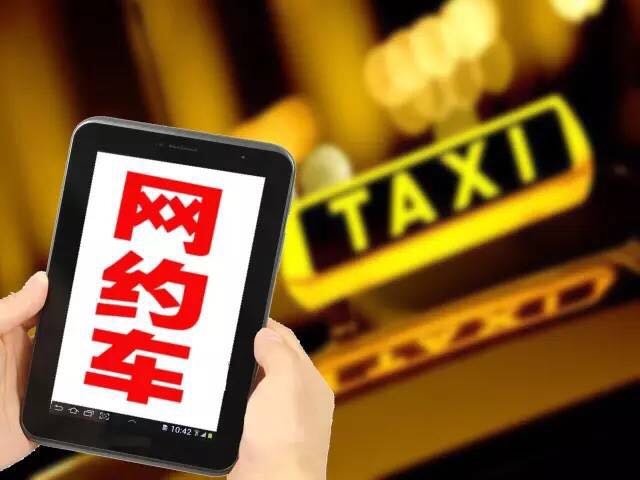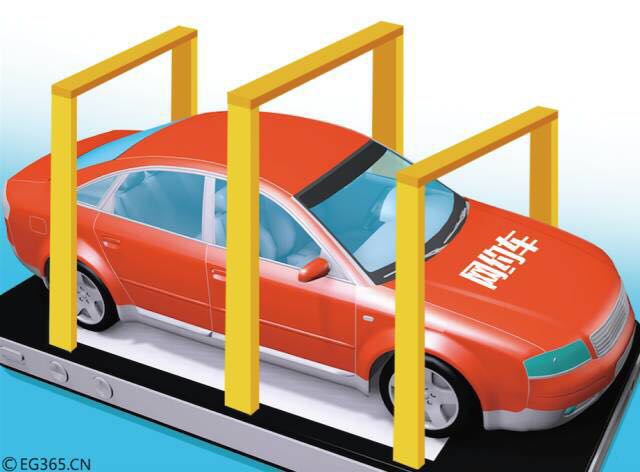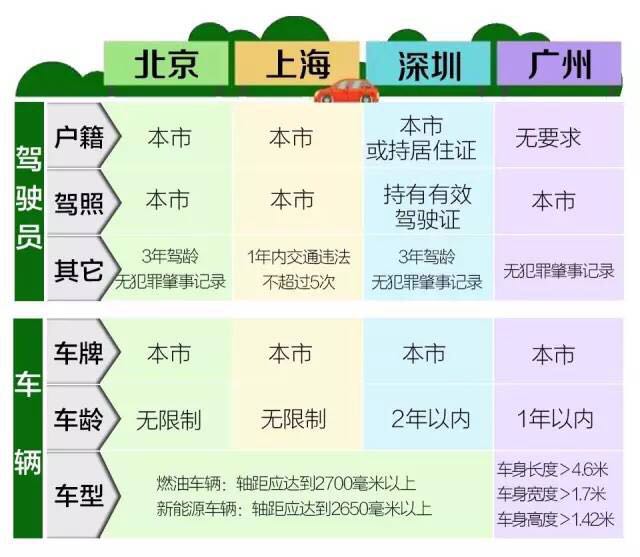How should the new policy of online car-hailing start with controversy and end with consensus?
CCTV News:Following the exposure draft of the four cities of Beijing, Shanghai, Shenzhen and Guangzhou yesterday, Chongqing, Hangzhou and other places have also followed up quickly, and will make specific provisions on local online car pricing, driver qualifications, vehicle qualifications, etc.
Driver’s household registration and vehicle license plates have become hot topics for netizens to discuss
After the release of the detailed exposure draft, it immediately caused a heated discussion. In the message area of the CCTV News WeChat public platform, netizens discussed the hottest, mainly focusing on issues such as ride safety, driver’s household registration and vehicle license plates.Some netizens believe that the restrictions on driver registration and license plates in Beijing and Shanghai are too strict, and the top priority should be to ensure the safety of passengers.
Phantastishch:I think these conditions must first ensure the safety of ride-hailing customers, which is a major premise. Is it possible to require drivers who engage in online ride-hailing to go to the local public security department for the record first, which is a constraint on them.
Empty Valley Orchid:Personally, I don’t think it is necessary to have a household registration and a vehicle in this city, but the quality of the driver should be good and the integrity should be high.

At the same time, there are also netizens who believe that a large number of online car-hailing vehicles are located outside the country, causing illegal parking and charging disputes to continue.
Mr. lonely:A local license plate should be required. In addition, the driver should be strictly reviewed to see if there is any illegal record. I personally feel that after all, in big cities, if you have a driving experience of less than 2 to 3 years, don’t come out to pick people up!
Back to nature. : I think the online car-hailing should be from this city, and the car in this city. In this case, personal information is easier to understand, and even if there is anything wrong, it is not so difficult to deal with!
Recently, when the Shanghai traffic law enforcement department rectified the chaos of online car-hailing, it was found that in the Hongqiao transportation hub area, the three online car-hailing platforms, Didi, Uber, and Yidao, all had lax checks and acquiesced in the situation of drivers and foreign-branded vehicles who did not have operating qualifications.
In the vicinity of Dawang Road in Beijing, at night, online taxis waiting for orders and picking up passengers queue up with some carpooling vehicles to the suburbs, stretching for hundreds of meters, accounting for two of the four lanes. Among them, online taxis with foreign license plates also account for a considerable proportion.

Beijing Transportation Commission: "Beijing People and Beijing Vehicles" Consider Population, Congestion and Air Quality
On the one hand, many people think that the rules are too strict. If implemented as such, it will inevitably lead to a significant decrease in the number of qualified online car-hailing drivers (taking Shanghai as an example, there are data showing that there are only more than 10,000 online car-hailing drivers with Shanghai household registration, and only a fraction of the 410,000 drivers who have been activated), which will lead to rising prices and affect the convenience of travel. On the other hand, it is also impossible to ignore that since the establishment of the online car-hailing platform, various problems have emerged one after another, especially the fact that although the car-hailing in other places has brought convenience to some people, it has also objectively exacerbated the congestion in some areas.
In response to why "Beijing people, Beijing cars" are required in the exposure draft of Beijing’s online car-hailing implementation rules, the Beijing Municipal Transportation Commission explained today that online car-hailing,This is determined by considering factors such as the city’s population, urban traffic congestion, and air quality.Some experts said that the "Beijing People and Beijing Car" was formulated with full consideration of Beijing’s needs for employment and population relief, and should be affirmed.
Around the net about car exposure draft centralized introduction, which revealed those important signals? As the net about car market ultimate participants, how should we participate in the formulation of policy?
CCTV Review
Strict management of online car-hailing "savage growth" stage will end
With the introduction of the new net car exposure draft, although it has not been officially implemented, it has made the entire net car field face new policy thresholds.A series of regulations, from local hukou and local cars to the large number of new cars, all suggest that the current new policy may be stricter on the management of online car-hailing. This may mark the end of the stage of "wild growth" of online car-hailing.

Map/Visual China
In the past few years, under the trend of "Internet +" and "sharing economy", the online car-hailing market has flourished from scratch, and a number of powerful enterprises have emerged. At the same time, with a large number of subsidies, cheap and fast online car-hailing has also changed the travel habits of many people.
However, due to the fact that online car-hailing is a new thing in the market, the management of this field is relatively lagging behind, so there are also some problems in the market. For example, there are large loopholes in the standards of people and vehicles, and lax security measures. The management of these aspects has stayed at the level of internal norms of each company, and has not yet formed a unified rule for the whole industry. The introduction of the new policy is to make up for the shortcomings of the policy by summarizing the practice of the online car-hailing industry.
The New Deal should be "economic fast", not black humor
Regulating and supervising new things is a necessary way. The question is how to regulate and supervise? At present, the whole society has reached a consensus on some general aspects. For example, making transportation more efficient and safer through Internet platforms, reducing congestion, reducing carbon emissions, and relieving the functions of core cities. No matter whether it is the regulators in Beijing and Shanghai, or the people living in these places and the online car-hailing platforms, they will not object to these.
Therefore, the New Deal certainly cannot go against these. But from the current exposure draft,In the setting of online ride-hailing management, many standards are higher than those of taxis. This can certainly reduce the impact on the traditional industry, but in this way, whether online ride-hailing can continue to maintain its economic and fast advantages will be put into question, and online ride-hailing platforms will become more and more like taxi companies. Passengers originally hoped that the development of online ride-hailing could force taxi companies to reform, but if the result turned into online ride-hailing "being recruited", it would become a black humor in the development of the Internet economy.

In addition, the restrictions on displacement and vehicle wheelbase in the exposure draft are also considered to be inconsistent with the concept of green travel.
Thirdly, there is also a lot of controversy over whether online ride-hailing drivers must have local household registration. After all, many places (including Beijing and Shanghai itself) are implementing the residence permit system, and gradually realizing that the public services enjoyed by the residence permit are consistent with those of registered residents.
Finally, the provisions on ride-hailing in the exposure draft are basically determined to be newly added operating vehicles, rather than encouraging private car owners to engage in ride-hailing or ride-sharing business. This essentially solves the travel problem by increasing the operation of vehicles, which is contrary to the essence of the sharing economy. Because the sharing economy itself solves the travel problem of more people by improving the operating efficiency of existing vehicles.
Only by asking the people for policies can we find the greatest common denominator of the interests of all parties
Judging from the feedback from all parties on the exposure draft, the controversy is relatively large, which is not a bad thing. In essence, these disputes should only be differences in the ways in which the parties achieve the common goal, rather than the pursuit of the goal itself. And this goal is to facilitate travel, travel safely, and reduce congestion. To solve this problem, we need to really listen to public opinion and find the intersection of interests between the parties after full controversy.
More than two months ago, the Ministry of Transport officially issued the "Guiding Opinions on Deepening Reform and Further Promoting the Healthy Development of the Taxi Industry" and the "Interim Measures for the Management of Online Booking Taxi Business Services". The legalization of online car-hailing has ushered in unanimous praise from all parties. This is also the result of collecting public opinion after 9 months. The exposure draft released in October last year was also criticized by the society at the beginning, and the jokers jumped out to complain. However, the rules issued after extensive consultation finally relaxed some standards based on actual feedback, and gained recognition in the design of innovative systems to give play to local autonomy, as well as the "tailor-made" standardized development of online car-hailing.
At present, the details of online car-hailing, including Beijing and Shanghai, are also soliciting public opinion, hoping to fully absorb the opinions of all parties in the decision-making process. Start with dispute and end with consensus. This is the result of a win-win situation for all parties. Written by CCTV Commentary, Wang Yahong